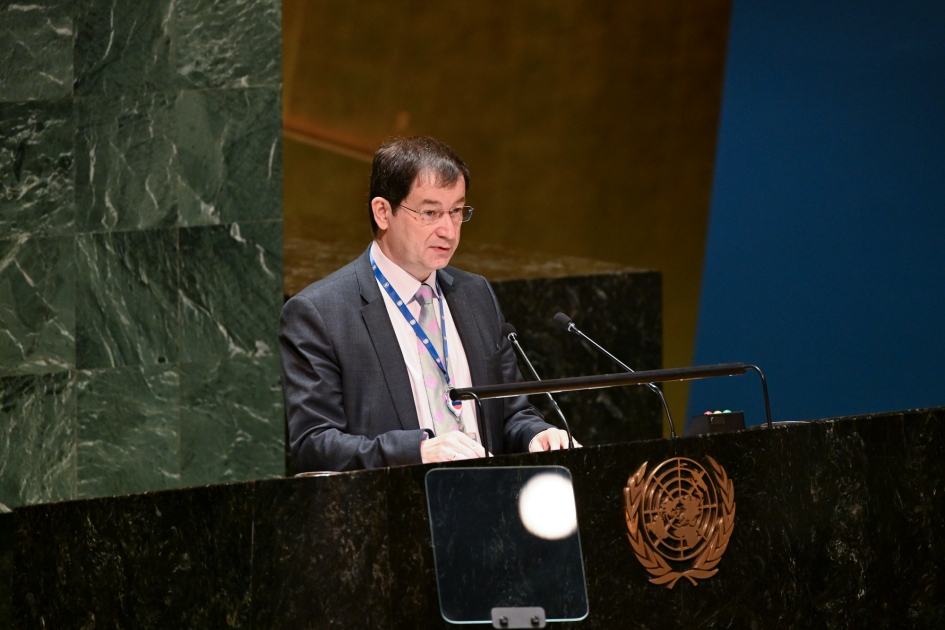Statement by First Deputy Permanent Representative Dmitry Polyanskiy at UNGA meeting regarding the use of veto at the Security Council
Mr.President,
Two years ago, General Assembly adopted resolution 76/262 on considering the cases of veto use by Security Council permanent members.
We see that during this time the resolution failed to prove its value. This is not surprising, because it was conceived primarily as a tool for self-promotion of its authors. The latter decided to use for their own purposes the fact that amidst steadily growing turbulence in international relations, opportunities for finding a compromise when the Council considers complex issues of international peace and security have shrunk significantly. At the same time, proponents of UNSC criticism try to ignore the hard, sometimes 24/7 work of the members of the Security Council in an effort to find a compromise. Non-permanent member states that recently completed their 2-year tenures at the Council can confirm that firsthand. Only if it becomes clear that no compromise can be found (or if an initiative under consideration is designed with the sole purpose of compromising an opponent), the veto is used.
Supporters of this controversial idea, which entitles them to take the floor at UNGA tribune once a year and praise their own selves for implementing it, proceed solely from statistics and do not attempt to analyze the causes and consequences of the use of veto by permanent members of the Security Council in each specific case. But these circumstances are extremely important. For example, our American colleagues have used veto four times since last October to make sure that nothing prevents Israel from continuing its brutal and IHL-violating operation in Gaza, which has already claimed the lives of more than 34,000 Palestinian civilians, most of them women and children. The US also vetoed the resolution on Palestine's full membership in the UN. Their use of veto runs counter to the will of the overwhelming number of UN member states, which was reflected, in particular, in the resolution adopted by the UNGA during its resumed Special Session on December 12, 2023, which received 153 votes in favor.
On the other side, Russia’s and China’s vetoes of the US-proposed draft resolution on Gaza on March 22 allowed the Council, three days later, to adopt a concise resolution drafted by the ten elected members, at the heart of which was a direct demand for an immediate ceasefire for the period of Ramadan that would lead to a sustainable ceasefire. Therefore, the decision of our Chinese colleagues and ourselves was the only correct one and reflected the will of the overwhelming majority of the international community. This situation is the best response to those who criticize the veto power of Security Council’s P5, and the best confirmation that the mechanistic approach of the initiators of today's discussion is pointless, because none of them even mentioned this difference in the quality of vetoes.
Mr.President,
We have consistently stated both in the Security Council Chamber and in the intergovernmental negotiations on UNSC reform that the veto power of its permanent members is the cornerstone of the entire United Nations architecture. Without it, the Council would turn into a body that would rubber stamp dubious decisions imposed by a conditional majority, the implementation of which would be hardly possible.
Of course, the veto is the extreme measure to be used only when other options have been exhausted. Russia has never concealed the reasons for using a veto, and we remain ready to explain them, including in the General Assembly. All our statements to that end are available through open sources.
However, we should not forget that the veto is also an inalienable right, a full part of the mechanisms enshrined in Article 27 of the UN Charter. The use of veto is not a violation. We are convinced that it is not the veto itself that should be criticized, but the unwillingness of some Council members to hear and heed the views of others and to find compromise and balanced solutions. The case of the United States covering up Israel's actions in Gaza that I spoke about is the best illustration of that.
Criticism should also befall those who do not comply with the provisions of Security Council resolutions, deliberately ignore them or afford loose interpretations. The international community, in particular, is still confused about the United States' statement that “UNSC resolutions are not legally binding”. This is a clear violation of the UN Charter. Among such resolutions that are being consistently sabotaged by Western colleagues are the decisions on Palestine, Western Sahara, the Kosovo settlement, and the Iranian nuclear program. Back in the day, they tried to ignore the Minsk Agreements on the settlement of the internal Ukrainian conflict, which were endorsed by a UN Security Council resolution. The outcomes of this criminal and short-sighted policy can be clearly seen today in Ukraine.
Colleagues, instead of today's useless discussion of the veto right, which essentially boils down to indiscriminate criticism of the Security Council, we do urge you to think about the need for a clear division of labor between the Security Council and the General Assembly, so that neither of these bodies encroaches on the prerogatives of the other, and so that they act in full accordance with the UN Charter. This will benefit both the United Nations and the entire system of international relations, which is undergoing a difficult transformation towards genuine multilateralism.
Thank you.
